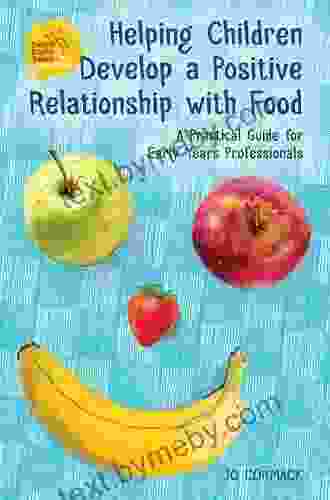Helping Children Develop Positive Relationships With Food: A Comprehensive Guide for Parents and Educators

5 out of 5
| Language | : | English |
| File size | : | 2603 KB |
| Text-to-Speech | : | Enabled |
| Screen Reader | : | Supported |
| Enhanced typesetting | : | Enabled |
| Word Wise | : | Enabled |
| Print length | : | 211 pages |
A positive relationship with food is crucial for children's overall well-being, setting the foundation for healthy eating habits and a lifelong love for nourishing foods. This guide provides comprehensive advice and practical strategies for parents and educators to foster a supportive and empowering food environment that promotes children's health and well-being.
Understanding the Importance of a Positive Food Relationship
A positive food relationship involves a balanced approach to eating, characterized by:
- Enjoying a variety of nutritious foods without guilt or anxiety
- Respecting hunger and fullness cues
- Developing a positive body image
- Making mindful and informed food choices
- Experiencing mealtimes as enjoyable and social occasions
A positive food relationship contributes to:
- Reduced risk of eating disFree Downloads and obesity
- Improved physical and mental health
- Increased self-esteem and well-being
- Enhanced social skills
- Lifelong healthy eating habits
Creating a Positive Food Environment
Parents and educators play a significant role in creating a positive food environment for children. Here are key strategies:
1. Model Healthy Eating Habits
Children learn through observation. By modeling healthy eating habits, parents and educators can demonstrate the importance of balanced meals, nutritious snacks, and a variety of food choices.
2. Avoid Food Restrictions
Strict food restrictions can lead to children developing a negative association with food and an unhealthy preoccupation with eating. Instead, encourage children to explore different foods and make choices within reasonable limits.
3. Provide Nutrient-Rich Foods
Offer children a variety of nutrient-rich foods from all food groups to meet their growing needs. Focus on fruits, vegetables, whole grains, lean protein, and healthy fats.
4. Cook and Eat Together
Mealtimes provide opportunities for bonding and teaching children about food. Involve children in meal preparation, allowing them to experience the joy of cooking and appreciate the process of creating healthy meals.
5. Make Mealtimes Enjoyable
Mealtimes should be positive and enjoyable occasions. Create a relaxed and comfortable atmosphere, free from distractions and judgment. Engage in conversations and share stories to foster social connections.
6. Address Emotional Eating
Children may turn to food for comfort or to cope with stress. Help them identify and express their emotions in healthy ways, such as through talking, drawing, or physical activity.
Supporting Children's Food Choices
As children grow older, they develop independence and make more of their own food choices. Encourage them by:
1. Providing Guidance
Offer age-appropriate guidance and information about healthy eating choices. Explain the benefits of nutrient-rich foods and the importance of variety.
2. Respecting Child's Preferences
Recognize that children have their own preferences and allow them to participate in making food decisions. Encourage them to try new foods, but don't force them to eat foods they dislike.
3. Promoting Body Positivity
Foster a positive body image by promoting realistic and diverse representations of bodies. Avoid comments about weight or size, and emphasize that everyone's body is unique and worthy of respect.
4. Teaching Intuitive Eating
Encourage children to develop intuitive eating skills by listening to their hunger and fullness cues. Help them understand that eating well is about nourishing their bodies with a variety of foods.
Fostering a positive relationship with food in children requires a multi-faceted approach, involving parents, educators, and children themselves. By following evidence-based strategies and creating a supportive food environment, we can empower children to develop healthy eating habits, a positive body image, and lifelong well-being.
Creating a positive relationship with food is an ongoing journey, filled with challenges and triumphs. By embracing compassion, patience, and a commitment to fostering healthy habits, we can guide children towards a vibrant, fulfilling relationship with food that nourishes both their bodies and their spirits.
5 out of 5
| Language | : | English |
| File size | : | 2603 KB |
| Text-to-Speech | : | Enabled |
| Screen Reader | : | Supported |
| Enhanced typesetting | : | Enabled |
| Word Wise | : | Enabled |
| Print length | : | 211 pages |
Do you want to contribute by writing guest posts on this blog?
Please contact us and send us a resume of previous articles that you have written.
 Book
Book Novel
Novel Page
Page Chapter
Chapter Text
Text Story
Story Genre
Genre Reader
Reader Library
Library Paperback
Paperback E-book
E-book Magazine
Magazine Newspaper
Newspaper Paragraph
Paragraph Sentence
Sentence Bookmark
Bookmark Shelf
Shelf Glossary
Glossary Bibliography
Bibliography Foreword
Foreword Preface
Preface Synopsis
Synopsis Annotation
Annotation Footnote
Footnote Manuscript
Manuscript Scroll
Scroll Codex
Codex Tome
Tome Bestseller
Bestseller Classics
Classics Library card
Library card Narrative
Narrative Biography
Biography Autobiography
Autobiography Memoir
Memoir Reference
Reference Encyclopedia
Encyclopedia Nicole Trope
Nicole Trope Lorraine Hansberry
Lorraine Hansberry Mark Owens
Mark Owens Richard H Coop
Richard H Coop Paul T Hellyer
Paul T Hellyer Sylvester Murray
Sylvester Murray Marion Franklin
Marion Franklin Sharon N Covington
Sharon N Covington Zanna Sloniowska
Zanna Sloniowska Stephen K Hayes
Stephen K Hayes Lisa Shea
Lisa Shea Marianne Taylor
Marianne Taylor Philip Gibson
Philip Gibson Margaret Starbird
Margaret Starbird Ralph H Hruban
Ralph H Hruban Maia Weinstock
Maia Weinstock Susan Mayse
Susan Mayse Mark Bourrie
Mark Bourrie Leslie Quinsay
Leslie Quinsay Richard Sennett
Richard Sennett
Light bulbAdvertise smarter! Our strategic ad space ensures maximum exposure. Reserve your spot today!

 Ernest J. GainesRevolutionaries, Rebels, and Rogues of Rhode Island: The Wicked History of...
Ernest J. GainesRevolutionaries, Rebels, and Rogues of Rhode Island: The Wicked History of...
 George Bernard ShawInternational Equilibrium and Bretton Woods: The Economic Foundations of the...
George Bernard ShawInternational Equilibrium and Bretton Woods: The Economic Foundations of the...
 Ryūnosuke AkutagawaTaking Latin America Seriously: A Journey into the Heart of a Complex and...
Ryūnosuke AkutagawaTaking Latin America Seriously: A Journey into the Heart of a Complex and...
 Curtis StewartFrom the Depths of Despair to the Heights of Success: A Journey of Resilience...
Curtis StewartFrom the Depths of Despair to the Heights of Success: A Journey of Resilience... Robert BrowningFollow ·16.1k
Robert BrowningFollow ·16.1k Thomas MannFollow ·19.2k
Thomas MannFollow ·19.2k Robert Louis StevensonFollow ·12.3k
Robert Louis StevensonFollow ·12.3k Mikhail BulgakovFollow ·3.8k
Mikhail BulgakovFollow ·3.8k Colin FosterFollow ·6.7k
Colin FosterFollow ·6.7k George HayesFollow ·17.5k
George HayesFollow ·17.5k Jacob HayesFollow ·3.1k
Jacob HayesFollow ·3.1k Quentin PowellFollow ·4.6k
Quentin PowellFollow ·4.6k

 Clay Powell
Clay Powell20 Must Visit Attractions In La Paz, Bolivia
La Paz, Bolivia...

 Giovanni Mitchell
Giovanni MitchellUltimate Guide to Special Forces Skills, Tactics, and...
The world of...

 Joseph Heller
Joseph HellerThe Texas Ranger and Hunter Illustrated: A Visual Journey...
Prepare to embark on an...

 José Martí
José MartíThe Secrets and Science of Ads That Sell More: A...
Are you struggling to create...

 Eli Blair
Eli BlairAdolescents and Their Families: A Comprehensive Guide for...
Adolescence,...

 Neil Gaiman
Neil GaimanMosby Diagnostic and Laboratory Test Reference: The...
In the dynamic healthcare landscape, staying...
5 out of 5
| Language | : | English |
| File size | : | 2603 KB |
| Text-to-Speech | : | Enabled |
| Screen Reader | : | Supported |
| Enhanced typesetting | : | Enabled |
| Word Wise | : | Enabled |
| Print length | : | 211 pages |




